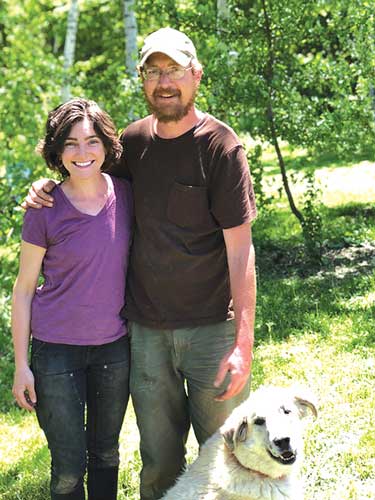 |
| Farmers Courtney Williams and Ryan Clarke with farm dog Evelyn. Photo by Jon Walsh |
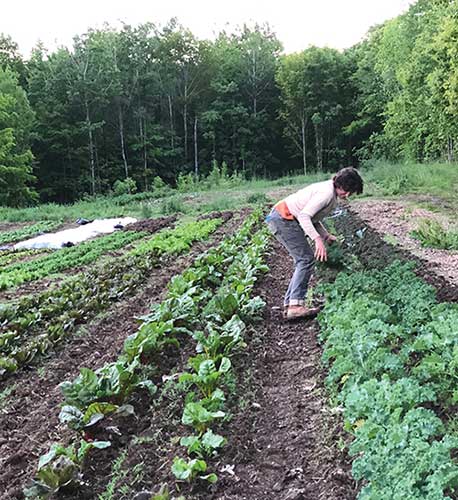 |
| Harvesting kale in one of Marr Pond Farm’s production fields. Photo by Jon Walsh |
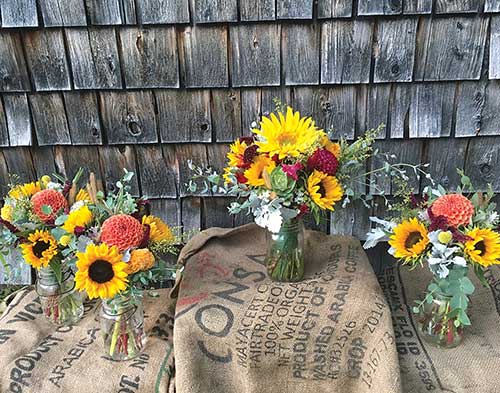 |
| Some of Williams’ cut flower bouquets. Photo courtesy of Marr Pond Farm |
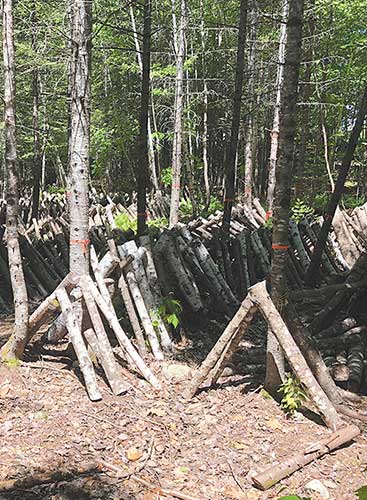 |
| Shiitake production logs in the farm forest. Photo by Jon Walsh |
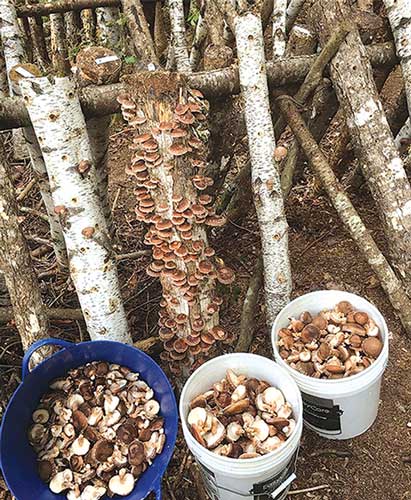 |
| Shiitake mushrooms harvested for market. Photo courtesy of Marr Pond Farm |
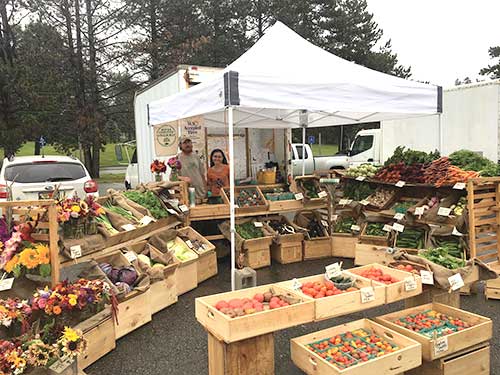 |
| The Marr Pond farmers’ market stand. Photo courtesy of Marr Pond Farm |
By Jon Walsh
To many visitors, Marr Pond Farm in Sangerville, Maine, gives the impression of having emerged organically from the surrounding forest. Part of this feeling comes from the way the production fields are bordered by dense forests and from the ever-present cries of the loons on summer nights. It certainly also helps that a large part of the farm production system lies within the forest itself. Beneath the canopy of the trees, a system of carefully arranged logs provides habitat for hundreds of shiitake mushrooms. Alongside a wide variety of vegetables and cut flowers, these mushrooms represent a unique part of this farm’s regenerative approach to agriculture.
Marr Pond Farm produces MOFGA-certified organic mixed vegetables, cut flowers, culinary herbs and forest-grown shiitake mushrooms. Crops are grown with an emphasis on soil health and sustainable management practices, including cover copping, composting, and reduced tillage to minimize erosion and impact on the local watershed. Farmers Ryan Clarke and Courtney Williams describe themselves as participants in a long local tradition of agriculture and land stewardship, a fact clearly reflected in their care of the land and supportive relationships with their neighbors and customers.
Farm Origins
Before starting their own farm, both Clarke and Williams had accumulated years of farm experience and training. Growing up on his grandparents’ dairy farm in Westbrook, Maine, Clarke learned to drive a tractor when he was 8 years old and planted his first garden in high school. In 2003 he completed a Northeast Organic Farming Association apprenticeship at Back Acres Farm in Glover, Vermont. Later he got a full-time farm job at Clovercrest Farm, where he learned the ins and outs of organic dairy farming. In 2012 Clarke bought a small piece of overgrown, undeveloped land near Marr Pond in Sangerville and slowly started to reclaim it for agricultural use.
Williams’ farming experience began as a child raising horses on her parents’ farm in Connecticut. While attending college in Boston, she started growing vegetables, both in a community garden and on the deck of her urban apartment. “I took a bunch of 2 liter soda bottles, filled them with soil and made vertical chain gardens that would water themselves,” she remembers, “That was pretty crazy, but it worked.” In 2012 she completed a MOFGA farm apprenticeship at Crystal Spring Farm in Brunswick, where she gained experience in production agriculture. Now she is a MOFGA journeyperson.
Williams also worked as MOFGA’s Common Ground Country Fair coordinator from 2014 to 2016.
After meeting in 2014, Williams and Clarke began to hatch the idea of a farm business based on Clarke’s land in Sangerville. In 2016 they planted their first crop of vegetables there. Four years after its founding, Marr Pond Farm is now an established and successful organic operation with a loyal customer base and well-functioning mixed vegetable production system.
Growing and Marketing
The farm consists of 20 acres of cultivated and forested land adjoining a dirt road. Along with a few residential and storage buildings, the farmers built two high tunnels and a small greenhouse on the land. One high tunnel is home to tomatoes, dahlias, eucalyptus, peppers and eggplants; the other provides a space to experiment with new crops. The small, wood-heated greenhouse produces all the seedlings used on the farm as well as space to cure garlic, onions, dry beans and winter squash. Two acres of the vegetable fields are adjacent to the farmhouse, while the other 3 acres in production are across the street on land leased from a neighbor. Also included in this lease is a building that the farmers use for vegetable storage, washing and packing for market. Marr Pond itself is an 80-acre, shallow, undeveloped pond. The farmers are working with the USDA Natural Resources Conservation Service on plans for an irrigation system that will draw from the pond.
Given their diverse crops, Clarke and Williams keep quite busy during the growing season. To help manage all this work, they employ three part-time farm staff and hope to add an assistant farm manager in 2020. In addition they divide the tasks according to their skills and interests. Williams, for example, focuses on flowers, artichokes, winter squash, melons and dry beans, along with almost all of the marketing, delivery and farmers’ market sales. Clarke spends more of his time on the farm doing tractor work and managing staff.
The farm’s business model is constantly evolving but is currently based on a balance of farmers’ market sales, a Community Supported Agriculture (CSA) enterprise and some wholesaling of farm produce. At the moment most sales come from the farm’s participation in the weekly Waterville and twice-weekly Orono farmers’ markets, where Marr Pond Farm has developed a loyal customer base drawn to its attractive market display, cut flower arrangements and delicious variety of vegetables.
In their second year of farming, Clarke and Williams decided to develop a CSA in order to provide fresh produce to their local community. Currently the CSA has 23 members, and it continues to grow each year. The Piscataquis County location is helping with this growth. As Clarke points out, “The market for CSAs here is not saturated yet, and there is still a growing demand for local food.”
“A big part of our job now is educating people about what CSAs are all about,” Williams adds. “Interest has come and gone in other parts of the state. Here it is still fairly new.”
While Clarke and Williams are both excited about expanding their CSA, they emphasize that for now the farm remains focused on growing and selling vegetables at farmers’ markets. Even so, the farmers continue to explore new ideas and new crops. Two of their most promising niche crops are cut flowers and shiitake mushrooms.
A Focus on Cut Flowers
Among its regular market and CSA customers, Marr Pond Farm is known for its flowers. The farm’s market stand is typically adorned in beautiful flower arrangements, and customers seek out the farm stand for its cut flower bouquets and arrangements. This was not always part of the plan.
“When we first started farming, I planted some flowers for pollinators and had wildflowers all over the place,” Williams recounts. “I filled a few Mason jars with them and mixed them in with our vegetables to brighten up our market stand. I was so surprised when people started asking to buy them that I said no at first!” Despite this initial hesitation, cut flowers have since become an integral part of the farm’s business structure. Last year the farm grew about one-half acre of cut flowers for sale as bouquets at the Orono farmers’ market.
Through developing a focus on cut flowers, the farmers hope to take advantage of a recent consumer trend toward supporting sustainable flower production. “I think customers are starting to realize the environmental and social impact of imported flowers that are grown chemically intensively by low-wage workers and shipped long distances to the U.S. markets,” Williams explains.
Alongside these cut flower sales, she has also started to develop a reputation for growing and designing flower arrangements for weddings and other events. While her skills as a farm-to-table florist have led to numerous satisfied customers, Williams explains that this type of event also comes with many challenges, ensuring that events remain a small but rewarding part of her farm work.
Cultivating Forest-Grown Mushrooms
Marr Pond Farm also specializes in cultivating mushrooms. As Clarke explains, mushrooms “are a good crop to complement mixed vegetables because a lot of people don’t grow them and they are harder to find at markets. People really love shiitakes because they are versatile and pack a big nutritional punch.”
Growing shiitake mushrooms is a multi-year, multi-step process that begins with log selection. For shitake production, hardwood logs are ideal, particularly oak, but at Marr Pond the highest priority is using logs from the farm’s own forest. As Williams says, “For us, this is a crop where we are trying to really make good use of the land that we have and the woodlot that we have.” Based on this approach, they use a variety of unconventional wood types, including gray birch, sugar maple, red maple and beech.
To produce mushrooms they first inoculate logs with shiitake mycelium, which feeds on the lignin in the wood. Each spring, farm staff members drill dozens of holes in each log using an adapted angle grinder. Next they push inoculated wood sawdust, known as spawn, into each hole using a specialized inoculation tool. (They buy spawn from Field & Forest Products in Wisconsin – https://www.fieldforest.net/.) In the final stage of the process, they cover the holes with melted wax to seal moisture in and prevent the spawn from drying out. Once the logs have been prepared, they are labeled and stacked in horizontal piles or “crib stacks” in the forest, where they incubate for a full year.
After a year, the logs are ready to produce and are leaned against horizontal wooden rails to form long A-frames. When tiny mushrooms (“pins”) start to appear, the logs are “shocked” or soaked in cold water for 24 hours to encourage fruiting. Once the mushrooms are ready, they are harvested throughout the summer and into late fall.
In addition to growing shiitakes for market, the farmers use mushrooms to amend farm soil. As Williams explains, “Winecap stropharia is a fast-acting mycelium that we mix into woodchip mulch to rapidly break down woodchips and create fungally dominant soils for our perennial crops like fruit trees, flowers and asparagus.” As an extra benefit, winecap mushrooms are edible and a good source of protein. Incorporating mushrooms into the farm production system aligns well with the farmers’ interest in permaculture systems.
Events and Plans
As Marr Pond Farm continues to develop and grow, Clarke and Williams plan to keep busy. In addition to constantly improving their skills in vegetable, mushroom and flower cultivation and marketing, they hope to increase their direct local sales through their CSA. As Williams says, “While we travel over an hour to more urban areas to sell most of our products, it’s really important to us to also feed families in the Maine Highlands, where we live and farm.”
They also intend to continue their involvement in the local community, particularly through the East Sangerville Grange. “We are trying to help the Grange get back to its agricultural roots in the community,” Williams says. Clarke is the former grange master, and he and Williams spearheaded formation of the grange’s Farmer Committee. This committee has coordinated bulk purchases for farmers, and it hosts regular agricultural events, including weekly farmer-driven work parties that help member-farmers with big projects during busy times.
In May 2020 Marr Pond Farm will host its sixth annual mushroom cultivation workshop. Clarke and Williams will teach other small farmers, homesteaders and gardeners how to cultivate log-grown shiitakes, set up their own mushroom yards, harvest quality products, and more. Preregistration is required and will be available via the farm’s Facebook page.
Through their strength in vegetable production and their niche cultivation of organic cut flowers and mushrooms, Clarke and Williams have developed Marr Pond Farm into a successful operation. With their genuine interest in community involvement and their commitment to using regenerative practices that work with the land, these farmers are at the forefront of a new generation of organic producers in Maine working to expand interest in local agriculture to new parts of the state.
About the author: Jon Walsh is from Winslow, Maine. He writes about organic agriculture and policy and has enjoyed watching Marr Pond Farm develop from an idea to a thriving reality. Walsh is a former Common Ground Country Fair assistant and former MOFGA farm apprentice.
